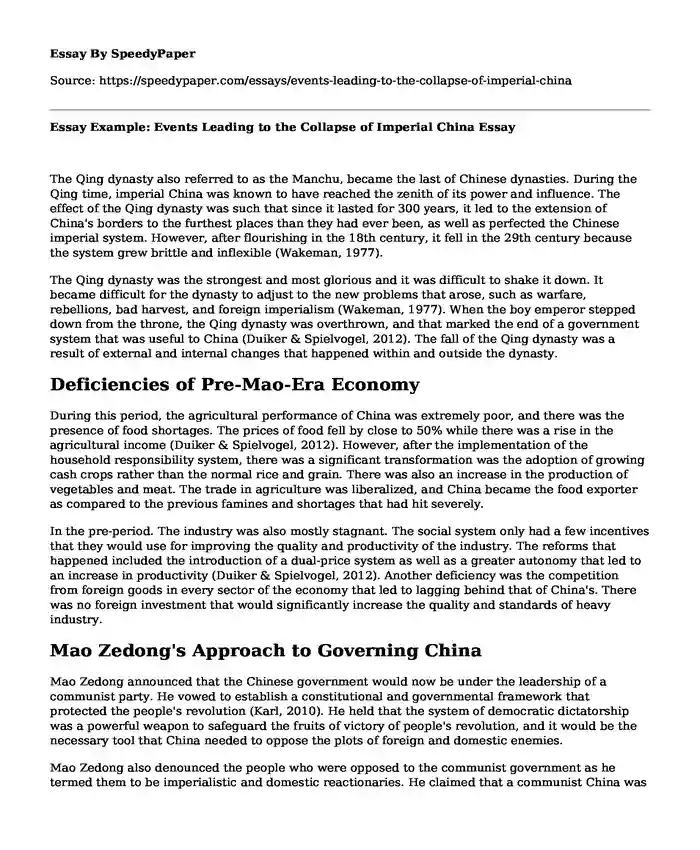
| Type of paper: | Essay |
| Categories: | Politics Asia Essays by wordcount Historical & political figures |
| Pages: | 3 |
| Wordcount: | 614 words |
The Qing dynasty also referred to as the Manchu, became the last of Chinese dynasties. During the Qing time, imperial China was known to have reached the zenith of its power and influence. The effect of the Qing dynasty was such that since it lasted for 300 years, it led to the extension of China's borders to the furthest places than they had ever been, as well as perfected the Chinese imperial system. However, after flourishing in the 18th century, it fell in the 29th century because the system grew brittle and inflexible (Wakeman, 1977).
The Qing dynasty was the strongest and most glorious and it was difficult to shake it down. It became difficult for the dynasty to adjust to the new problems that arose, such as warfare, rebellions, bad harvest, and foreign imperialism (Wakeman, 1977). When the boy emperor stepped down from the throne, the Qing dynasty was overthrown, and that marked the end of a government system that was useful to China (Duiker & Spielvogel, 2012). The fall of the Qing dynasty was a result of external and internal changes that happened within and outside the dynasty.
Deficiencies of Pre-Mao-Era Economy
During this period, the agricultural performance of China was extremely poor, and there was the presence of food shortages. The prices of food fell by close to 50% while there was a rise in the agricultural income (Duiker & Spielvogel, 2012). However, after the implementation of the household responsibility system, there was a significant transformation was the adoption of growing cash crops rather than the normal rice and grain. There was also an increase in the production of vegetables and meat. The trade in agriculture was liberalized, and China became the food exporter as compared to the previous famines and shortages that had hit severely.
In the pre-period. The industry was also mostly stagnant. The social system only had a few incentives that they would use for improving the quality and productivity of the industry. The reforms that happened included the introduction of a dual-price system as well as a greater autonomy that led to an increase in productivity (Duiker & Spielvogel, 2012). Another deficiency was the competition from foreign goods in every sector of the economy that led to lagging behind that of China's. There was no foreign investment that would significantly increase the quality and standards of heavy industry.
Mao Zedong's Approach to Governing China
Mao Zedong announced that the Chinese government would now be under the leadership of a communist party. He vowed to establish a constitutional and governmental framework that protected the people's revolution (Karl, 2010). He held that the system of democratic dictatorship was a powerful weapon to safeguard the fruits of victory of people's revolution, and it would be the necessary tool that China needed to oppose the plots of foreign and domestic enemies.
Mao Zedong also denounced the people who were opposed to the communist government as he termed them to be imperialistic and domestic reactionaries. He claimed that a communist China was the real deal as it would be of help in ending reputation as a country that was less-developed (Karl, 2010). It was going to mark the end f the uncivilization of China, and its people would enjoy the immense benefits. Mao Zedong was confident that the communist way was an excellent direction for China to follow with him being in charge.
Reference
Duiker, W. J., & Spielvogel, J. J. (2012). Chapter 22, 23,24,25: The Essential World History, Volume II: Since 1500. Nelson Education.
Karl, R. E. (2010). Mao Zedong and China in the twentieth-century world: A concise history. Duke University Press.
Wakeman, F. (1977). Fall of imperial China. Simon and Schuster.
Cite this page
Essay Example: Events Leading to the Collapse of Imperial China. (2024, Jan 14). Retrieved from https://speedypaper.com/essays/events-leading-to-the-collapse-of-imperial-china
Request Removal
If you are the original author of this essay and no longer wish to have it published on the SpeedyPaper website, please click below to request its removal:
- Essay Example about Poverty in Children
- Essay Example: Social Life of Cities and People's Sense of Who They Are
- Free Essay Sample on Human Resource Trend
- Essay Sample: Cholecystitis Treatment and Management, The Biopsychosocial View
- Essay Example with a Movie Review for Breakfast Club
- Free Paper Sample Describing the Application of Ethical Leadership
- Anxiety Management Essay Example
Popular categories




